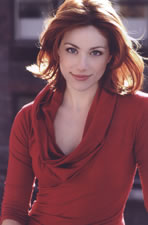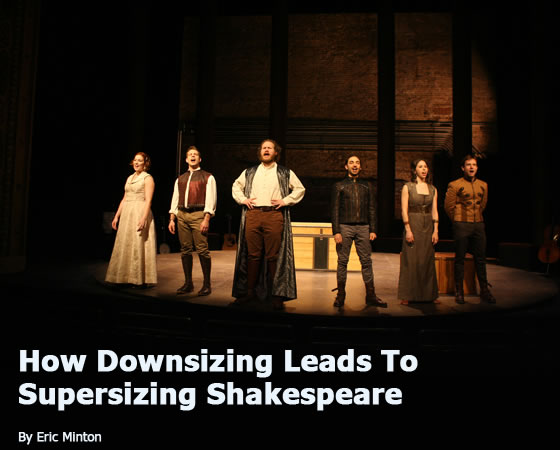A Conversation with the Founders of Fiasco Theater
It's not just Measure for Measure—it's Fiasco's Measure for Measure. And, oh my, the last show The Folger is producing this season is Fiasco's version of The Two Gentlemen of Verona. Shakespeare's most maligned play—most maligned by me, at least—is suddenly a compelling offering because Fiasco is doing it. Not only that but, as a bonus Folger season subscriber, we get discounted tickets to Fiasco's Cymbeline on the heels of Two Gents' run.
That Cymbeline, which had nearly 200 Off-Broadway performances from 2011–2012 and became the critics' darling of the entire New York theater scene, has come to define Fiasco Theater as a company because of the manner in which it was done: with just six actors and a single multiuse trunk for a set. In proximity to the megaproduction Spider-Man, Fiasco's pared-down but still-dynamic Cymbeline—not just Shakespeare but obscure Shakespeare—became a counterpoint to the problem-plagued, critically-savaged, big-name, big-bomb musical and heightened both Cymbeline's success and Fiasco's brand.
As with any hot brand, we eagerly anticipate what they will do with Shakespeare the next time.
In fact, what they do with Shakespeare is Shakespeare. Every time.
"We're trying to listen to the play as much as we can and tease out what we think is going on thematically," says Ben Steinfeld, co-founder along with Jessie Austrian and Noah Brody of Fiasco Theater. "Once we've hooked into what the underlying vocabulary and architecture is, then we can talk about the handful of things that we think are really going on in the show and decide how to try to capitalize on that with the way we put it on stage."
This dedication to the text first informs how actors are doubled in various parts, not only logistically but also thematically (in fact, thematic fealty trumps logistics, in some cases). It also informs their sets. As much as the acting was lauded in Cymbeline, a trunk designed by Jacques Roy received the lion's share of the show's critical acclaim. It served as the set and a multitude of props, which was fitting because it not only proved practical but illustrated an allegorical arc of the play (or at least a sick pun).
Having not seen their Cymbeline but hearing so much about it, I snagged the chance to see Measure for Measure at the New Victory Theater in February and settled in to see what six actors with six doors would do with one of my favorite Shakespeare plays. In addition to the three company founders, the cast included Paul L. Coffey, Andy Grotelueschen, and Emily Young, who were also in Cymbeline. I saw great acting, yes; ingenious doubling, definitely; clever use of doors, absolutely. However, what most struck me was how textually pure this staging turned out to be—excepting the need to drop a key character in the climactic wrap-up scene—and how well it highlighted the internal and interpersonal moral and social conundrums Shakespeare explores in this comedy as the six doors formed a variety of urban settings while illustrating the nature of human desires, hidden and exposed. I didn't walk away marveling that I had just seen Fiasco Shakespeare in a cleverly sparse performance; I walked away exulting that I had seen pure Shakespeare in a thoroughly-studied, multifaceted production.
It's a seeming contradiction all the more pronounced when you look at the company's current repertoire. Aside from an early production of Twelfth Night, its three commercial productions are three of Shakespeare's rarely produced plays (the company also has produced Stephen Sondheim's Into the Woods with 10 actors and a pianist). "We haven't actually looked at each other and said, 'Hey, let's find these problematic plays or plays that aren't so popular,'" says Brody. "They are actually the ones that made the most sense to us based upon the cast, the people that we have available, and the things we find interesting about those plays."
"Interesting things" include subject matter, theme, content. Another criteria would be the play's ensemble quality, not just whether the work is in itself an ensemble piece but also how well its characters can be doubled and tripled to create an ensemble piece. "We wanted to make it worth actors' while to come on board with us, so we wanted to double and triple as many parts as possible to make it a real ensemble show," Austrian says. "So part of why we create tracks that double and triple characters is so that each actor gets a lot to work on, and nobody plays a spear carrier who waits off stage for two hours doing a crossword puzzle."

Above: The Fiasco cast in Cymbeline. Left to right, Jessie Austrian, Noah Brody, Andy Grotelueschen, Ben Steinfeld, Emily Young, and Paul Coffey. Photo by Ari Mintz, Fiasco Theater.
Jessie Austrian (right), Ben Steinfeld (below), and Noah Brody (bottom).


The primary criteria, though, are "plays that have parts that we really want to play," Brody says. "We self-identify as actors first."
Fiasco Theater's roots began with the Brown University/Trinity Rep MFA Acting Program. The actors met there and began collaborating on projects, and when, with their MFA degrees, they headed out into the world of commercial theater and teaching jobs, they discovered too little interesting in what little work they were getting. So, they began collaborating on various projects, starting with a workshop production of The Two Gentlemen of Verona in 2007. The first of their Shakespeare projects to make it to a commercial stage was Cymbeline at the 50-seat Access Theater in New York City in 2009. Once Cymbeline's 15-performance run concluded, Fiasco's members moved on, so they thought, to their next project, an eight-person Twelfth Night at Access in the spring of 2010.
But there was particularly strong magic in their Cymbeline; before Twelfth Night's run began, they learned that Theater for a New Audience wanted to pick up Cymbeline for its 2011 season. In the fall of that year, it was revived at the Barrow Street Theater and would also do a run at The Broad Stage in Los Angeles. The company mounted Into the Woods for the McCarter Theatre Center in Princeton, N.J. last May, and this May Fiasco is taking up residence at The Folger with Two Gentlemen of Verona and yet another revival of Cymbeline with the original cast (for The Two Gentlemen of Verona, Zachary Fine is joining the ensemble, replacing Steinfeld in the acting troupe though Steinfeld is co-directing the play). Into The Woods is also heading for an L.A. run and then scheduled to open in New York next winter.
Upon seeing their Measure for Measure, knowing about their Cymbeline, and anticipating their Two Gents, I endeavored to interview members of the company for Shakespeareances.com. This came in a phone call with the three cofounders, Austrian, Brody, and Steinfeld, on the evening of March 25. They had just finished their New Victory Theater run and were turning full attention to staging Two Gents in The Folger's Elizabethan theater. Many of their ideas for the production had yet to fully gestate at the time of the interview. Steinfeld could only spend about 20 minutes with us—he was calling from a train—and the other two didn't have much more time than that, so I focused first on the Shakespearean foundation of their work and followed up with some email questions later [which appear in brackets in the interview].
April 24, 2014
[To read the full interview, click here] [For a PDF of this interview, click here]



 Find additional Shakespeareances
Find additional Shakespeareances